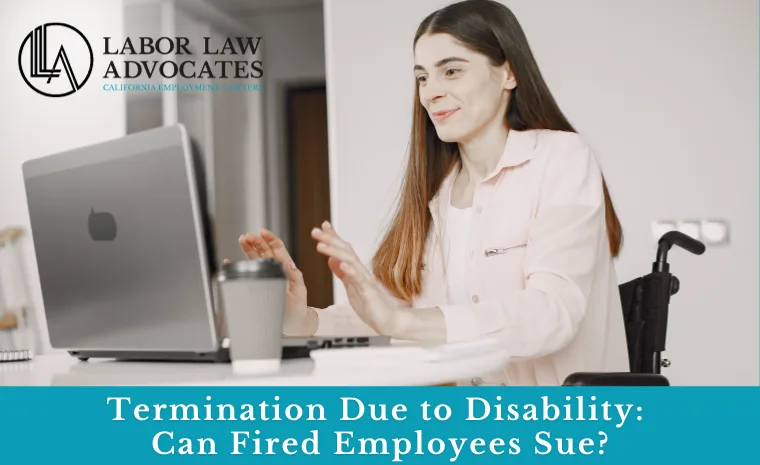Termination Due to Disability: Can Fired Employees Sue?
Losing your job is never easy, but when it happens because of a disability, it can feel even more unjust. A disability is a medical condition that limits a person’s ability to engage in a major life activity. Fortunately, California law provides protection against wrongful termination due to disability.
In this blog, we will discuss:
- Definition of disability discrimination under California law
- Protected disabilities
- Signs of potential termination due to disability cases
- Common employer excuses
- Legal protections and remedies available to employees
- Challenges and the role of a legal representation
Fired due to your disability? Let us help you file a wrongful termination claim.
Understanding Disability Discrimination
In California, disability discrimination is prohibited under both state and federal laws. Under the California Fair Employment and Housing Act (FEHA) and the federal Americans with Disabilities Act (ADA), employers are forbidden from discriminating against employees based on their disabilities.
Protected Disabilities in California
Protected disabilities encompass a wide range of conditions, including physical, mental, and chronic illnesses. California’s Civil Rights Department outlines the disabilities protected under the law. Some common examples of protected disabilities include:
- Physical Disabilities: FEHA provides extensive protection for individuals with physical disabilities. This includes conditions such as mobility impairments, amputations, paralysis, and chronic illnesses that significantly affect one’s bodily functions. People with disabilities are entitled to reasonable accommodations to perform their job duties effectively.
- Mental Disabilities: California law recognizes mental impairment as protected disabilities. Employees dealing with conditions like depression, anxiety, bipolar disorder, or post-traumatic stress disorder (PTSD) are safeguarded against discrimination. Employers must also make accommodations for disabled workers, such as providing a flexible work schedule or allowing time off for therapy or treatment.
- Sensory Disabilities: Visual and hearing impairments are also protected disabilities in California. This includes individuals who are blind or deaf and those with conditions that affect their hearing or vision. Employers are required to provide necessary accommodations, such as assistive devices or communication support, to ensure equal access to employment opportunities.
- Chronic Health Conditions: Individuals with chronic illnesses like diabetes, epilepsy, or HIV/AIDS are protected under FEHA. Employers must make reasonable accommodations to enable these employees to manage their health while fulfilling their job responsibilities. This might include flexible break times or adjustments to workload.
- Cancer: Cancer is considered a protected disability in California. Employees who have been diagnosed with cancer are entitled to legal protections against discrimination and harassment. Employers should provide accommodations like time off for treatment and a supportive work environment.
- Genetic Information: Genetic information and characteristics are also protected from discrimination. This includes information about an individual’s genetic makeup that could be associated with the risk of developing a disability. Employers cannot use genetic information as a basis for employment decisions.
These protections extend not only to employees but also to job applicants. Employers are prohibited from discriminating against job seekers based on their disability status.
Furthermore, employers in California are required to engage in an interactive process with employees or applicants who request accommodations for their disabilities. This process involves discussions between the employer and the individual to determine reasonable accommodations that enable them to perform their job effectively.

Recognizing Signs of Potential Cases
Termination due to disability can manifest in various ways, and it’s essential to recognize the signs that may indicate you have a potential case. These signs may include:
- Sudden job loss after disclosing a disability or requesting accommodation.
- Unjustified negative performance evaluations or disciplinary actions following disclosure.
- Isolation, harassment, or undue hardship by colleagues or supervisors due to your disability.
- Being denied reasonable accommodations that would allow you to do essential functions at work.
- Retaliation for filing a complaint or seeking legal assistance regarding disability discrimination.
Common Employer Excuses
When faced with allegations of disability-related terminations, employers often present seemingly valid reasons to justify their actions. While these reasons may appear legitimate at first glance, it’s essential to scrutinize them to determine whether they are genuine or mere pretexts for discrimination. Some of the common employer excuses include:
- Poor Job Performance
Employers frequently cite poor job performance as the reason for terminating workers with disabilities. While this may be true in some cases, you must check whether the alleged performance issues were adequately addressed and accommodated. If an employer fails to provide reasonable accommodations or support, it raises questions about whether the termination was, in fact, a result of discrimination.
Tip: Keep records of your job performance, any accommodations you requested, and communication with your employer regarding your disability. This documentation can be invaluable in challenging claims of poor performance. - Company Downsizing
Companies occasionally undergo restructuring or downsizing to remain competitive. During these times, layoffs may occur. However, examine whether disabled employees were disproportionately affected. If it appears that only employees with disabilities were targeted for termination, it may suggest discrimination rather than a genuine business necessity.
Tip: Analyze the timing of layoffs and whether there were other cost-saving measures considered before resorting to job cuts. This can help determine if downsizing was a pretext for discrimination. - Violation of Workplace Policies
Employers may argue that the terminated employee violated company policies or engaged in misconduct as a justification for their termination. While violating workplace policies can lead to dismissal, it’s essential to assess whether these policies were consistently enforced for all employees or if they were selectively applied to employees with a short or long-term disability.
Tip: Review company policies and investigate whether similar violations by other employees have resulted in termination or similar disciplinary actions. Inconsistencies can raise suspicions of discrimination.
In any case, when faced with any of these common excuses, consult with an experienced employment attorney. They can help you assess the validity of the employer’s reasons and guide you through the process of gathering evidence to support your claim of wrongful termination due to disability.
Legal Protections and Remedies
If you find yourself in the unfortunate situation of being wrongfully terminated due to a disability, it’s imperative to arm yourself with knowledge about your rights and the potential remedies available to rectify this injustice. Let’s explore the legal protections and remedies at your disposal:
Legal Protections
- Filing a Complaint: You possess the fundamental right to file a complaint with either the Department of Fair Employment and Housing (DFEH) or the Equal Employment Opportunity Commission (EEOC). This is a critical initial step to initiate an investigation into your case. Importantly, it’s illegal for your employer to retaliate against you for exercising this right. Your job security remains intact as you seek justice.
Remedies
- Reinstatement: A successful disability discrimination claim can lead to your reinstatement to your previous position. This remedy aims to restore your employment status as if the wrongful termination never occurred.
- Back Pay: You may be entitled to back pay, which covers the wages and benefits you lost from the date of your termination to the date of your reinstatement or a settlement agreement.
- Front Pay: In cases where reinstatement is not feasible or suitable, front pay may be awarded. Front pay compensates you for the anticipated future earnings and benefits you would have received if you had continued working for your employer.
- Compensation for Emotional Distress: Experiencing wrongful termination due to disability can be emotionally distressing. Compensation for emotional distress aims to address the psychological impact of the work discrimination you endured.
- Attorney’s Fees: In many instances, successful disability discrimination claims can result in your employer being responsible for covering your attorney’s fees and legal expenses. This ensures that pursuing justice doesn’t become a financial burden.
Punitive Damages
Punitive damages, while not guaranteed in every case, hold the potential to significantly enhance the compensation awarded in a disability discrimination lawsuit. These damages serve a dual purpose:
- Punishing the employer for their unlawful actions
- Deterring them and others from engaging in discriminatory behavior in the future.
To be eligible for punitive damages, it’s typically necessary to demonstrate that your employer’s conduct was particularly egregious, involving malice, fraud, oppression, or reckless indifference to your rights.
Challenges and the Role of Legal Representation
While pursuing a disability discrimination law claim is an option, it can be challenging. Employers often have resources and legal teams to defend against unlawful actions. Here’s where legal representation becomes essential:
- Proving Discrimination: Demonstrating that discrimination occurs can be complex. The employee must provide proof of disability and unlawful actions against them, while an experienced attorney can help gather evidence and build a compelling case.
- Navigating the Legal Process: Legal representation from a reputable law firm can guide you through the complex legal procedures, ensuring your case is properly filed, and deadlines are met.
- Negotiation and Settlement: Attorneys can negotiate with your employer for a fair settlement, potentially avoiding a lengthy and emotionally taxing trial.
FAQs on Disability Benefits in California
If I work for the State of California but reside and perform my job in a different state, does the State Disability Insurance (SDI) still cover me?
Indeed, yes. According to California’s Employment Development Department (EDD), if you belong to a qualifying bargaining unit and meet the other eligibility criteria for SDI, you can submit claims and receive benefits under this type of health insurance coverage.
What is the difference between SDI, Paid Family Leave (PFL), and employee leave laws?
DI and PFL are distinct programs that offer wage replacement benefits exclusively; they do not grant job protection. It’s essential to note that SDI and PFL operate independently of federal and state leave laws, having no impact on their provisions. Your job security as an individual with disability may be safeguarded under separate employee leave laws like the Family and Medical Leave law (FMLA) or California Family Rights Act (CFRA).
SDI steps in to provide financial assistance for up to 52 weeks when you face a wage loss due to your own non-work-related illness, injury, long-term disability, pregnancy, or childbirth.
On the other hand, PFL offers up to eight weeks of paid benefits in scenarios involving wage loss due to specific situations, including:
- Caring for a seriously ill family member.
- Bonding with a new child.
- Participating in a qualifying event prompted by a family member’s military deployment to a foreign country.
Can I file claims for monetary damages if I was terminated unlawfully because of my disability?
Yes, if you were unlawfully terminated due to your disability, you may be able to seek monetary damages through legal action. These damages can include compensation for lost wages, benefits, emotional distress, and, in some cases, punitive damages. To pursue such damages, it is advisable to consult with an employment attorney who specializes in disability discrimination cases. They can help you assess the merits of your case and guide you through the legal process to seek appropriate compensation for the wrongful termination.
Consult with an Employment Law Attorney
Termination due to disability is not only emotionally distressing but can also be illegal under California law. Understanding your rights, recognizing signs of potential cases, and seeking legal representation if necessary are vital steps in seeking justice for wrongful termination.
Remember that the law is on your side, and you have the right to fight for your rights and remedies in the face of discrimination. Let Labor Law Advocates help you get the justice you deserve.
Consult with the most qualified employment law attorney in California for legal advice today. Speak with one of the experts at Labor Law Advocates for a free consultation. We are available 24/7. Call us anytime at (424)-688-3632.




